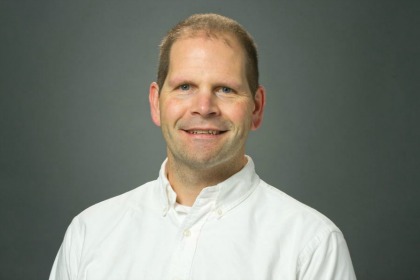Matthew Poynter, Ph.D., knows that a scientist’s work can influence public policy. In his lab at the University of Vermont College of Medicine, he focuses on the environmental factors that trigger the immune system’s development of asthma.

Matthew Poynter, Ph.D., UVM Professor of Pulmonary Medicine and newly-appointed Director of the Cellular, Molecular and Biomedical Sciences Program. (Photo: COM Design & Photography)
Matthew Poynter, Ph.D., knows that a scientist’s work can influence public policy.
In his lab at the University of Vermont College of Medicine, he focuses on the environmental factors that trigger the immune system’s development of asthma. The UVM professor of pulmonary medicine has found that exposure to high levels of nitrogen dioxide can increase the risk of asthma.
Poynter’s findings have helped spur states and school districts across the country to enact rules prohibiting buses and cars from idling, which releases “NOxes” – nitrogen oxides produced during combustion – in front of schools. That’s an example of the role that scientific discoveries at the cellular and molecular level can play in widespread government actions related to health and welfare, says Poynter, who was named director of the Cellular, Molecular and Biomedical Sciences (CMB) graduate program at UVM in December 2015.
The CMB program has an educational mission “to train the student in how to be competent, how to be ethical” as a scientist, says Poynter. In doing that, the program gives graduate students an opportunity to pursue unique and influential research in the labs of faculty mentors. From there, they’ll go on to faculty positions of their own; jobs in the private sector, in biotechnology sales or research and development; or decision-making roles in public policy or law.
“There’s a great satisfaction of being able to work both with your hands and with your head,” Poynter says. “It’s ultimately about being able to figure out something that no one else knows about and share it with everyone.”
Poynter came to UVM in 1998 as a postdoctoral fellow in environmental pathology to work with his faculty mentor, Yvonne Janssen-Heininger, Ph.D., professor of pathology. Poynter later received funding to launch his own lab in affiliation with the Vermont Lung Center – a national Center of Biomedical Research Excellence focused on the study, treatment and education of lung disease – of which he is associate director.
The CMB program brings together researchers from 16 UVM departments, creating a collaborative community that helps attract students as much as the work they’ll do here, Poynter says. “It is that collegial environment that we have at UVM that I think is so special.”
Currently, the CMB program has 47 students and 84 faculty members. Together, they are making various discoveries that are vital to human health, Poynter says, providing some examples:
- Robert Hondal, Ph.D., associate professor of biochemistry, and graduate student Drew Barber are trying to determine the function of the 21st amino acid, known as selenocysteine, and potential ways to harness their unique characteristics to treat disease.
- Dawei Li, Ph.D., assistant professor of microbiology and molecular genetics, and graduate student Arvis Sulovari are mining large databases of patient populations to examine the role that genetics play in many diseases.
- Arti Shukla, Ph.D., associate professor of pathology, and her graduate student Joyce Thompson are investigating the starting points of malignant mesothelioma and possible new treatments for that fatal lung cancer.
Shukla’s and Thompson’s research resonates with Poynter. His most recent graduate student, Edward Burgess, died from mesothelioma in late September.
“It makes people think about the reality – when you’re working on biomedical science – of how serious it is” for those directly affected by the disorders studied, he says.
Learn more about the CMB Program at UVM.